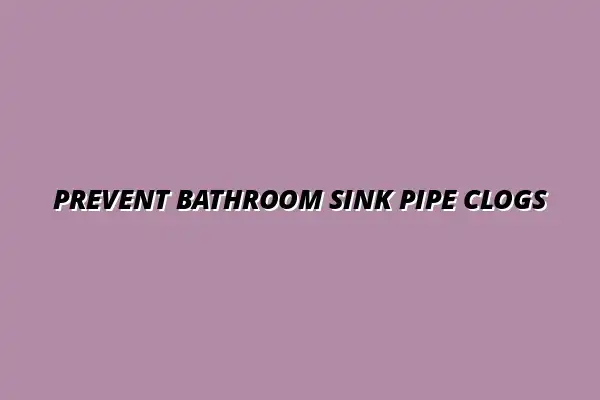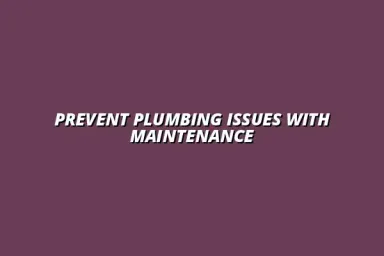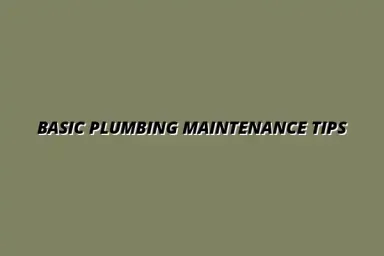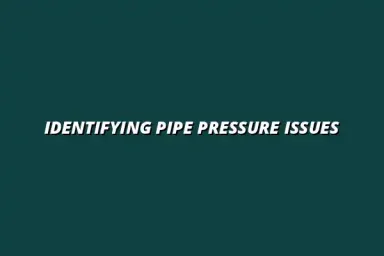Understanding the Causes of Bathroom Sink Clogs
Bathroom sink clogs are a common annoyance that can disrupt your daily routine. Understanding the underlying causes of these clogs is essential for effective prevention and management. By identifying these issues, you can keep your sink flowing smoothly and avoid costly plumbing repairs.
Several factors contribute to clogs in bathroom sink pipes. Hair, soap scum, and even foreign objects can play a significant role in causing blockages. Recognizing these culprits not only helps in addressing current clogs but also in preventing future ones. If you're experiencing a particularly stubborn clog, you might find helpful advice on how to unclog your bathroom sink easily.
Common Factors Leading to Clogs in Bathroom Sink Pipes
There are three primary factors that often lead to clogs in bathroom sinks. These include the accumulation of hair, soap scum buildup, and the introduction of foreign objects. Understanding these factors can help you take proactive measures to mitigate potential clogs!
- Hair accumulation
- Soap scum buildup
- Foreign objects
Hair Accumulation and Its Impact on Drainage
One of the most common causes of bathroom sink clogs is hair accumulation. Hair strands can easily get trapped in the drain and form a dense mass that restricts water flow. This can happen especially if you have long hair or frequently groom in the bathroom.
To combat hair clogs, consider using a drain cover to catch loose strands before they enter the pipes. Regularly cleaning the cover will help prevent hair accumulation and keep your drainage system functioning well.
Soap Scum Buildup and Contributing Factors
Another major contributor to clogs is soap scum buildup. Soap residues can combine with minerals in water, creating a thick layer of buildup inside the pipes. Over time, this can significantly narrow the drainage passage, leading to slow drains or complete blockages.
To minimize soap scum, use liquid soaps instead of bar soaps. Liquid soaps tend to leave behind less residue and can reduce the amount of buildup you're dealing with over time. Regular cleaning will also help in keeping soap scum at bay.
Foreign Objects and Their Role in Clogs
Foreign objects can also cause unexpected clogs in your bathroom sink. Items like toothpaste caps, cotton swabs, and hair ties can easily slip down the drain and create blockages. While it may seem harmless to let small items go down the sink, they can lead to bigger issues later on!
To prevent these types of clogs, make a habit of keeping small items away from the sink area. Consider placing a small dish nearby to collect such items instead of allowing them to slip into the drain. For more serious issues, such as a slow-draining bathroom pipe, professional help may be necessary.
Identifying Early Signs of Clogs to Prevent Future Issues
Recognizing the early signs of a clog can save you time and effort in the long run. By being aware of the symptoms indicating that a clog is developing, you can take action before the issue escalates. This proactive approach can help you maintain a smoother flowing sink!
Some common signs to look out for include slow draining water, unpleasant odors, and gurgling sounds. Addressing these issues promptly can help prevent more extensive problems. For instance, learning how to maintain plumbing to prevent repairs is a valuable skill.
Common Symptoms Indicating a Clog is Developing
As clogs start to develop, certain symptoms may begin to appear. Being aware of these symptoms allows you to catch problems early and avoid bigger headaches later!
- Slow draining water
- Unpleasant odors
- Gurgling sounds
Slow Draining Water and Its Implications
One of the first signs of a clog is when the water in your sink drains slowly. This usually indicates that something is blocking the flow of water. If left unaddressed, slow drainage can lead to a complete blockage, making it difficult to use your sink.
When you notice this symptom, it’s essential to investigate the cause. Often, a simple cleaning can resolve the issue before it worsens, so don’t ignore it!
Unpleasant Odors Emanating from the Sink
Another sign to watch for is unpleasant odors coming from your bathroom sink. These odors can arise from decomposing food particles, hair, or soap scum trapped in the pipes. If you start to smell something foul, it’s a clear indication that a clog may be forming.
To tackle odors, regular cleaning of your sink and drain is key. You can also flush your pipes with hot water or a vinegar and baking soda solution to help eliminate odors and keep your pipes fresh. Similar problems can occur in the kitchen; learning to identify signs of clogged kitchen drains can help you avoid bigger issues.
Gurgling Sounds That Signal Drain Problems
Gurgling sounds from your sink can be a clear signal that there’s a problem with your drainage system. These sounds often occur when air gets trapped due to a blockage, causing water to struggle to pass through. If you hear these sounds, it’s a good idea to investigate further.
Take action at the first sign of gurgling. By addressing the issue early, you can avoid more significant problems down the line and ensure your sink remains in good working order!
Addressing Common Questions About Preventing Bathroom Sink Clogs
When it comes to maintaining a healthy bathroom sink, understanding what not to put down the drain is crucial. Many homeowners often wonder about specific household items that can lead to serious clogs. Let's explore some common items that should never be disposed of in your sink and why they can cause problems.
By avoiding certain items, you can significantly reduce the chances of experiencing draining issues. Being informed is the first step toward effective clog prevention!
What Household Items Should Never Be Disposed of in the Sink?
Some everyday items may seem harmless but can wreak havoc on your plumbing. Here are a few household items that should stay out of the sink:
- Oils and Grease: These substances can solidify and create blockages.
- Feminine Products: Items like tampons and pads don’t break down and can lead to serious clogs.
- Food Waste: Even small bits of food can accumulate and create blockages over time.
- Hair: This can easily snag on other debris, leading to a clog.
By remembering to keep these items out of your sink, you'll help ensure a smoother flow in your plumbing system. Taking a moment to think twice can save you from bigger plumbing issues down the line! If you're dealing with a clogged kitchen sink, you'll find useful tips on fixing a clogged kitchen sink.
Explaining the Risks of Flushing Oils and Grease
Disposing of oils and grease in your sink might seem like a quick solution, but it’s a recipe for disaster! These substances can cool down and harden, leading to stubborn blockages. Instead of disposing of them down the drain, consider using a sealed container to throw them away properly.
Additionally, if you do accidentally pour some grease down the drain, running hot water may temporarily help. However, this method is not a long-term solution and doesn’t prevent future problems!
Understanding the Dangers of Flushing Feminine Products
Feminine hygiene products are often advertised as “flushable,” but that doesn’t mean they’re safe for your plumbing. Flushing these products can lead to severe clogs because they don’t break down in water like toilet paper does. It's essential to dispose of them in a trash can instead.
In fact, many plumbing professionals report that feminine products are a significant cause of plumbing issues. By keeping these products out of your sink, you protect your plumbing and save yourself from costly repairs!
Long-Term Strategies for Clog Prevention
Preventing bathroom sink clogs goes beyond just avoiding harmful items; it requires consistent maintenance and proactive measures. Establishing a routine can keep your sink in top shape. Let's dive into some effective strategies!
By implementing a regular maintenance schedule, you can easily protect your plumbing and avoid urgent repairs! For emergencies, you can always find a plumber in Deritend, Birmingham to assist you.
Establishing a Routine Maintenance Schedule
Creating a routine for cleaning and checking your sink can make a big difference. Here are some tips on how often you should tend to your bathroom sink:
- Weekly: Rinse the sink and remove any visible debris.
- Monthly: Deep clean the sink using a natural solution.
- Biannually: Check under the sink for leaks or signs of deterioration.
Following this simple schedule can greatly extend the life of your sink and help prevent unexpected clogs!
How Often Should You Clean Your Bathroom Sink?
Regular cleaning is essential for maintaining a clog-free sink. A good practice is to clean your sink at least once a week. Use gentle cleansers that won’t harm your plumbing, and make sure to scrub away any buildup.
Don't forget to clean your drain as well! A mixture of baking soda and vinegar can work wonders to keep it clear. Regular maintenance also applies to your water heater; find out more about water heater maintenance made simple.
Creating a Checklist for Drain Maintenance
Having a checklist can simplify your maintenance routine! Here are some items to include:
- Check for any slow drainage.
- Inspect for unusual odors.
- Clean the sink basin and faucet.
- Use a drain cleaner once a month.
By using a checklist, you'll ensure that no important tasks are overlooked, keeping your sink in great shape!
Recap of Best Practices to Ensure Clear Bathroom Sink Pipes
To maintain a clear bathroom sink, it’s essential to implement effective cleaning practices and actively prevent clogs. Summarizing key techniques can help reinforce what you need to do!
Each small action contributes to a larger goal of healthy plumbing. Here’s a recap of best practices!
Summarizing Key Techniques for Clog Prevention
To keep your bathroom sink pipes clear, remember these critical strategies:
- Avoid flushing harmful items down the sink.
- Establish a regular cleaning routine.
- Utilize natural cleaning solutions.
- Inspect and maintain fixtures regularly.
By following these guidelines, you can maintain a clog-free environment in your bathroom!
Highlighting Effective Cleaning Strategies
Cleaning your bathroom sink doesn’t have to be a chore! Use natural solutions like vinegar and baking soda to dissolve buildup. These options are not only effective but also eco-friendly!
And remember, consistency is key! Regular maintenance keeps everything flowing smoothly and prevents annoying clogs.
Encouraging Proactive Measures for Drain Health
Taking proactive measures goes a long way in protecting your plumbing. Share these tips with family and loved ones to create awareness! A little knowledge can prevent significant plumbing issues down the road.
Making small changes now can lead to a happier, clog-free bathroom experience!
Taking Action for a Clog-Free Bathroom Experience
Empowering yourself with knowledge is the first step to maintaining a clog-free bathroom. By understanding the risks and implementing maintenance strategies, you can tackle potential issues before they arise!
Let’s take action together and make our bathrooms a smooth-running space!
Empowering Homeowners to Implement Preventative Measures
Homeowners hold the power to change their bathrooms for the better! By implementing simple preventative measures, you can ensure a clog-free environment. Don't hesitate to take charge of your plumbing health!
Remember, the best solutions often come from your own proactive decisions!
Resources for Further Learning and Maintenance
There are plenty of resources available for homeowners looking to deepen their knowledge about plumbing maintenance. Websites, DIY videos, and local workshops can be great places to learn. The more you know, the better equipped you will be to handle any plumbing challenges!
Don’t shy away from seeking help when needed; always reach out to professionals for advice!
Encouraging Community Sharing of Tips and Experiences
Sharing experiences within your community can provide valuable insights and tips! Join local groups online or in-person to exchange useful information about home maintenance. You might discover new techniques or products that can keep your sink clear!
Let’s build a community of knowledge to support each other in maintaining a clog-free bathroom!

 Kiran Almasi
Kiran Almasi

